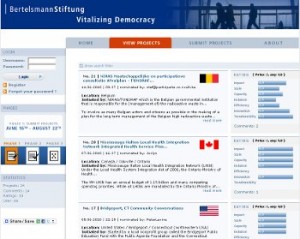Archive for the ‘inclusion’ Category
 |
16. November 2010 – 17:49 by Institute for Electronic Participation
|
 This year largest eDemocracy conference in South East Europe took place during 12-14th September, 2010 in Ohrid, Macedonia.
This year largest eDemocracy conference in South East Europe took place during 12-14th September, 2010 in Ohrid, Macedonia.
The e-Democracy Conference 2010 welcomed 30 delegations from 15 countries. 100 participants from Parliaments, Governments and Official Journals, as well as representatives from international organizations, business sector and academia were engaged in fruitful and interesting discussions about the role that ICT can play into improving the democracy and transparency of the public institutions. More information about the conference is available at https://www.edemocracy.mk.
The e-Democracy Conference 2010 topics included:
- Future and emerging technologies for e-Democracy
- Compliance and standards (EU perspective)
- How to support “Green IT” initiative in the policy development
- ICT in legislative knowledge management
- How can information technology transform the way parliaments and governments work
- Interoperability in the legislative process
- Parliaments and Democracy in the Twenty-first century
- State of ICT development in Parliaments
- ICT in parliaments current practices
- e-Parliaments-The Use of ICT to Improve Parliamentary Processes
The participants at the e-Democracy Conference 2010 agreed that the progress that Macedonia has made in using ICT for improving democracy is an example that all the countries in the region should follow.
Read the rest of this entry »
Posted in Events, good practice, inclusion, members, News, Tools, Trends, Visions | No Comments »
 |
28. June 2010 – 12:16 by John Heaven (TuTech Innovation GmbH)
|

Screenshot of vitalizing-democracy.org
As football fans worldwide roar at their televisions, the German Bertelsmann Stiftung is kicking off another prize with arguably more at stake than the World Cup. Has your project found new ways of involving underrepresented citizens? If so, you could be in with a chance of winning the Reinhard Mohn Prize 2011, with prize money of € 150,000!
If you know of a project run by a governmental organisation that deserves to win the Reinhard Mohn Prize 2011, simply visit vitalizing-democracy.org by 22nd August to nominate it. You can also discuss projects that have been submitted so far. By the following phase, which lasts until 6th October 2010, 20 projects will have been selected and you can continue to discuss them on the website. This will be followed by a public consultation before the prize is presented in June 2011 in Gütersloh, Germany. The person who nominates the winning project will be invited to the award ceremony. Read the rest of this entry »
Posted in good practice, inclusion, News, Projects, Uncategorized | 1 Comment »
 |
9. May 2010 – 20:33 by Dan Jellinek
|
Best Methods For Undemocratic E-Participation
The recent warnings from the Convention on International Trade in Endangered Species (Cites) that the internet poses a major threat to endangered species by providing an efficient communications network for traders were a reminder that the impact of the internet is not always positive.
In itself, like most technologies, the net is neutral, a tool to be used for social benefit or detriment. So when it comes to ‘e-participation’ – online tools allowing people to exchange and discuss ideas, organise into groups and affect the workings of their society – we should not be dazzled by the glitz and excitement of the latest buzzwords like ‘Web 2.0’ without stopping to consider how we can try to ensure that the effects of these technologies are as positive as possible.
We must ensure that the addition or integration of new digital channels does not make existing power structures less socially representative, and if possible, should improve democratic systems, for example by providing voices to people who previously would have struggled to be heard. Mastery of new technologies and ownership of expensive equipment must not become pre-requisites for engagement in e-participation.
Overall, technology is the servant, not the master, of a fair political system. To safeguard people’s rights a country’s democratic system must first be strengthened, with technology deployed in support. We must remember there are wrong ways of going about e-participation, ways which will tend to centralise power, reinforce existing social inequities or play into the hands of private power. The use of jargon; expensive, brand-new technologies; and technologies which are hard for poorer or less educated people to access may all, consciously or unconsciously, have such anti-democratic tendencies.
At a workshop at the EDEM10 conference in Krems, Austria in May 2010, ‘Best methods for undemocratic participation’, with the help of Hans Hagedorn of Zebralog, we asked the question the negative way around – – if we set out to make an e-participation system that was as undemocratic as possible, what would it be like?
The assembled group of e-democracy analysts and practitioners had a lot of fun answering this question. But there was a serious point to the exercise: first, the process of thinking about what had made projects unsuccessful in the past can be easier than thinking about what worked well, and more revealing: everyone remembers crazy or absurd examples of web projects that were hard to use, or unfathomable in purpose or outcome. By throwing these together, we have created a good starting point for further work to build the positive counterpart of rules to make it work, or pitfalls to avoid – an exercise for a later date.
So here we go with the latest list, as adapted from our brainstorming session: please do add further comments and suggestions here and we’ll hone the list further over the coming weeks and months, before deciding what else to do with it.
Best methods for undemocratic participation
1 – TOPICFOR DEBATE/CONSULTATION Read the rest of this entry »
Posted in Events, good practice, inclusion | 6 Comments »
 |
20. April 2010 – 15:06 by Madarász Csaba
|
The European Citizens Intiatiave is on the right track after the Lisbon Treaty to open new gates to the European Commission.

European Citizens Initiative
1 million signature – not so much, if we think about the population of Europe.
The ECI is giving a sharp outlook on their website about the passed public consultation and Commission’s points.
If you have not heard about the ECI -documents below helps to formulate opinion and getting know the project better visit their website https://www.citizens-initiative.eu/ or start browsing the core documents here:
Posted in inclusion, News, Projects | No Comments »
 |
16. February 2010 – 15:42 by Danish Technological Institute
|
For those of you who are not yet aware: The call for papers for the 2nd International Conference on eParticipation 2010 (ePart 2010 www.demo-net.org/epart) is now open.
ePart 2010 will take place 29 August to 2 September in Lausanne (CH). ePart is co-organised with EGOV 2010 conference so a chance to meet colleagues and peers in both fields.
ePart 2010 covers a whole range of research topics within area of eParticipation. The principal aim is to review research advances in both social and technological scientific domains, seeking to demonstrate new concepts, methods and styles of eParticipation.
ePart 2010 will in particular focuses on:
- The research landscape, directions and foundations
- Research methods, method integration and techniques
- Cultural and normative differences in eParticipation
- Comparative analyses of eParticipation practices
- eParticipation projects: design, implementation, evaluation, quality and impact
- Technologies for eParticipation, policy modelling, simulation and visualisation
- Online conversation and deliberation, eConsulation, ePoling, eLegislation, eElectioneering, eVoting, Social networking
- Education, training courses, and curricula
ePart 2010 papers submission – in line with the above focus areas – will be allowed in four distinct types of submissions:
- Completed research papers
- Ongoing research and innovative projects
- Workshops and panels on pertinent issues
- PhD colloquium submission.
ePart is closely aligned with EGOV 2010 – the IFIP eGovernment conference and the EGOV community. Note that this year both conferences will be located for the first time outside the DEXA cluster of conferences. ePart 2010 is sponsored by IFIP, WG8.5.
Important Dates
- Submission of papers: 3 March 2010
- Submission of workshop/panel proposals: 15 March 2010
- Submissions to PhD colloquium: 15 March 2010
- Notification of acceptance for papers: 30 March 2010
- Notification of acceptance for workshops/panels: 30 April 2010
Publication
All accepted completed research papers will be published by Springer LNCS. Ongoing research and innovation projects papers will be published by Trauner Druck. Outstanding research papers from the conference might be selected for further development and publication in a special issue of a relevant journal.
Conference chairs
- Ann Macintosh, The University of Leeds (UK)
- Efthimios Tambouris, University of Macedonia (GR)
- Olivier Glassey, IDHEAP- University of Lausanne (CH)
BY Danish Technological Institute/Morten Meyerhoff Nielsen
Posted in Events, inclusion, News, Projects, Trends, Uncategorized | No Comments »
 |
6. December 2009 – 14:55 by University Bergamo
|
In the public discourse about e-participation and e-democracy it is often undervalued the existing demands of participation arisen by citizens. In other words, too often citizens are represented as passive subjects that eventually became active if (when) stimulated by the institutions or experts.
Of course, to increase the number of politically active citizens is an important goal, as well as the direct participation on specific decision making processes. Nevertheless, it is also crucial to acknowledge the role of traditional channels of participation – as collective action, protest and claims by citizens – in controlling and stimulating the actions of the political elites.
Web 2.0 can be an important resource in these directions, by means of overcoming constrains due of the lack of access to ‘vertical’ media and the distance between political class and active citizenship. There are several recent examples of this kind of process (mainly in weak democracies and non democratic systems). In Europe, the yesterday’s demonstration in Rome seems to be a quite relevant case. A group of Italian bloggers and grassroots groups launched online this event and gathered about 350.000 fans on Facebook. Thanks to its wide resonance on the online sphere, the ‘purple’ demonstration – this colour has been identified both as a symbol of marked autonomy from political parties and of civil liberties – has then attracted also the interest of the Italian political parties of the Opposition. Even if one considers the difficult current situation of the Italian government, it should be admitted that, at least for a while, Italian citizens-bloggers and grassroots groups have succeed not only in mobilizing citizens (about 1million demonstrated in Rome and there were many local demonstrations in other Italian and European cities), but also in pulling a consistent part of the political class. We shall see whether this wide and successful mobilization, very critical towards the whole political class, may have a real impact on the institutional politics.
Have a look at: https://www.noberlusconiday.org/
Anna Carola Freschi
Posted in Events, inclusion, News, Trends, Uncategorized, Visions | No Comments »
 |
13. November 2009 – 10:01 by Civil College
|
I think, most of us can feel the hot air breezing us during thes days. I have just hit the engaging film from ConnectedRepublic supporting EUPS20, the declaration, which if you did not sign, it is high time, just now. I think all of us wishes it’s sucess, but have you tweeted about it today? Or called your facebook friends attention to it?
Above all scepticism of social media enthusiasm, there is really many things going on. Have you heard about, that OpenID biggest government boost is happening – according to Dana Blankenhorn, by the U.S. government endorsment of OpenID.
However, Malmö is a great city, with a lot of openness. The Garaget, a historical place for civil movements and an innovative social solution of the City, is offering the really warm role of being the host of this event: First Popular European Egovernment Conference, which is taking place in Malmö, paralell to the 5th Ministerial Conference on Egovernment – more in a Pecha Kucha / Unconference style, offering open spaces for discussion and agenda setting.
These events forerunner is the eGovernment Research and Innovation Conference , happening just right before these events.
Watching US NOW is good warmup. Do check it out, if you have not seen it.
It is obvious now I hope for everybody reading this blog, that the really intersting things are happening on two fronts. Most of us understands, that the open(source) community workers by hacking codes and fixing bugs are good citizens. Or more than good – they also share freely what they have back to the community. And those, who are going there and opening a space for discussion on the topic, they are partners for creating better governance. For now, the Swedish Minister, Mats Odell has confirmed his presence, according to the website of the Ministerial Conference thruogh Magnus Kolsjo‘s tweet.
I wish, that the social and scientifical openness will meet with good cultre. Just as the Minister for Local Governments and Financial Market says on his site:
“I want to ditch the unwritten law that keeps us from standing out from the crowd and make way for the Ingvar Kamprads of tomorrow and other dynamic people – for a society that will harness your creativity and your potential, so as to benefit you and other people.”
Check out the conference twitter page here: https://twitter.dijksman.com/
and look for the hashtags #malmo09 and #egov2009
Posted in Events, inclusion, News, Projects, Trends, Visions | No Comments »
![]() This year largest eDemocracy conference in South East Europe took place during 12-14th September, 2010 in Ohrid, Macedonia.
This year largest eDemocracy conference in South East Europe took place during 12-14th September, 2010 in Ohrid, Macedonia.








